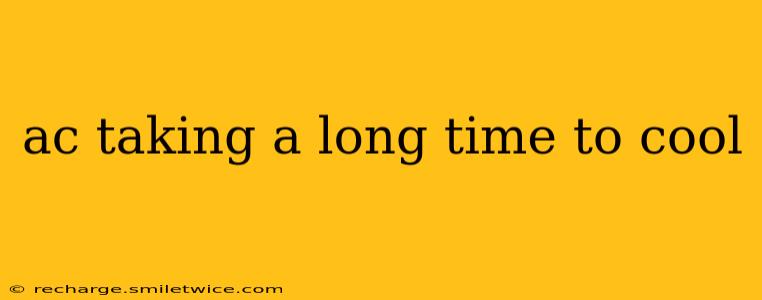Why is My AC Taking a Long Time to Cool? Troubleshooting Your Air Conditioner
Is your air conditioner struggling to cool your home? A slow-cooling AC can be incredibly frustrating, especially during those sweltering summer months. There are several reasons why your AC might be taking longer than usual to cool down, and diagnosing the problem is crucial for both your comfort and energy efficiency. This comprehensive guide will walk you through the most common causes and offer practical solutions.
Is My Air Filter Clogged?
This is often the simplest and most overlooked culprit. A dirty air filter restricts airflow, forcing your AC to work harder and longer to achieve the desired temperature. A clogged filter can significantly reduce cooling efficiency, leading to longer cooling times and potentially even damage to your system.
Solution: Check your air filter regularly (at least monthly) and replace it with a clean one when it becomes dirty. You'll often see a visible build-up of dust and debris. Replacing the filter is a quick, inexpensive fix that can drastically improve your AC's performance.
Are My Vents Blocked or Closed?
Proper airflow is vital for efficient cooling. Blocked or closed vents restrict the circulation of cool air, hindering the AC's ability to cool your home effectively. Furniture, curtains, or even piles of clutter can obstruct airflow.
Solution: Ensure all vents are open and unobstructed. Consider rearranging furniture to improve airflow and allow cool air to circulate freely throughout your home.
Is My Thermostat Set Correctly?
A simple mistake with your thermostat can lead to extended cooling times. Check that the thermostat is set to "cool," the temperature is appropriate for your preferences, and the fan is set to "auto" (unless you prefer constant fan circulation). Consider that some thermostats may require adjustments based on the time of day or occupancy.
Solution: Verify your thermostat settings and ensure they align with your desired cooling temperature and fan mode.
Is My AC Unit Properly Sized for My Home?
An undersized AC unit will struggle to cool a large space effectively, resulting in longer cooling times and higher energy bills. Conversely, an oversized unit may cycle on and off too quickly, leading to inconsistent temperatures. Proper sizing is crucial for optimal performance.
Solution: If you suspect your unit is improperly sized, consult with an HVAC professional for an assessment. They can determine if your system is adequately sized for your home's square footage and insulation.
Is My AC Leaking Refrigerant?
Refrigerant is the crucial component that facilitates the cooling process. A leak can severely impair your AC's ability to cool effectively, resulting in longer cooling times and potential damage to the compressor. This usually requires professional attention.
Solution: Look for signs of a refrigerant leak, such as frost or ice buildup on the coils. If you suspect a leak, immediately contact a qualified HVAC technician. Attempting to repair a refrigerant leak yourself is dangerous and can cause further damage.
Are My AC Coils Dirty or Clogged?
Dirty or clogged evaporator and condenser coils hamper heat transfer, hindering your AC's cooling capabilities. Over time, dust, dirt, and debris can accumulate on the coils, reducing efficiency and extending cooling times.
Solution: Cleaning your coils can improve efficiency. While some homeowners may attempt this themselves, it's often best to leave coil cleaning to professionals, especially if you're unsure of how to do it safely and effectively.
Is My Outdoor Unit Obstructed?
Your outdoor unit needs sufficient airflow to dissipate heat effectively. Obstructions like overgrown vegetation, debris, or even furniture can impede airflow, leading to overheating and reduced cooling performance.
Solution: Clear any obstructions around your outdoor unit, ensuring adequate space for air circulation. Regularly inspect the area to maintain clear airflow.
Addressing these potential issues should significantly improve your air conditioner's cooling performance. However, if problems persist after trying these solutions, it's crucial to call a qualified HVAC technician for professional diagnosis and repair. Ignoring problems can lead to more significant and costly issues in the long run.
